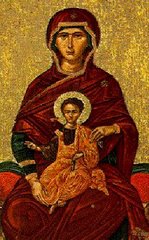Rationalism, as it was employed in Europe during the Enlightenment, stood in direct opposition to the Church. God, Revelation, Sacraments, Faith - none of these things seemed logical to rationalist thinkers. They saw the world as guided by natural laws and forces, reasoning, & mathematics, rather than Faith, Hope, & Love.
Some notable proponents of Rationalis are:
Leibniz, Spinoza, Descartes, Montesquie, Voltaire, Locke, Hobbes, and Hume. We shall discuss only one of these at length: Rene Descartes.

Descartes was a French mathematician and philosopher who assumed (that is, took on) a position of skepticism. By skepticism we don't simply mean being a pessimist or a negatively minded thinker. Philosophically a skeptic is one who doubts all statements without clear evidence or proof. Descartes doubted EVERYTHING: that God exists, that emotions are real, that his perception of reality was the same as anothers, even his own existence. He reasoned that there must be one foundational principle that would be beyond doubt and upon which he could build his philosophical system.
In the end, it became his very process of thinking that formed his foundational principle: "I think, therefore I am." (in Latin - the language of scholarship for most of western history, "Cogito ergo sum." in Descartes native French, "Je pense, donc je suis.")
Rationalism was good in that it opened the door to new worlds of knowledge, especially in mathematics and the natural sciences. It also led to new ways fo thinking in regard to government, law, politics and the structure of society. Combined with Nationalism, Rationalism changed the face of Europe and ushered civilization from the "Middle Ages" into the "Modern Era."
The downside of rationalism was it's utter rejection of Faith, and therefore the Church. It's obsession with the progress of humanity led to a rejection of tradition and history as well. In the end the Moral bedrock of western civilization was eroded and society plunged into a sea of relativism from which it has never really emerged.
Thomas Jefferson, famed champion of the separation of Church from State, was a quintessential Enlightenment thinker. In an attempt to "hold on" to the Faith of his ancestors, Jefferson did what many learned men of his age did and turned to Deism: the idea that God does exist, he did, at one point in time, create the world, and He established laws that govern it. However, He does not interfere with the world, but rather sits back as almost a spectator, watching the world from above. (Theism, on the other hand, is the idea that God remains intimately involved in the life of creation.) Jefferson even created his own version of the New Testament, which removed all the miracle stories - even the Resurrection so that the Gospels would be more "logical". You can read it online here.
Until next time,
Ad Jesum per Mariam,
Mr. B.

No comments:
Post a Comment